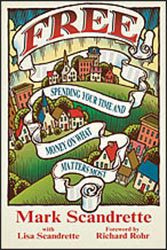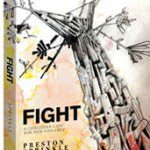 Mark Scandrette’s Free: Spending Your Time and Money on What Matters Most is a testimony to simple living. It is also, to the surprise of some readers, I suspect, a hymn to abundant life. The heart of the text can be found in Scandrette’s Prayer of Abundance (23), in which the affirmation that we are cared for by an abundant provider inspires us to bless the world by our actions and way of life.
Mark Scandrette’s Free: Spending Your Time and Money on What Matters Most is a testimony to simple living. It is also, to the surprise of some readers, I suspect, a hymn to abundant life. The heart of the text can be found in Scandrette’s Prayer of Abundance (23), in which the affirmation that we are cared for by an abundant provider inspires us to bless the world by our actions and way of life.
According to John’s Gospel, Jesus’ mission statement was “I came that they might have life in all its abundance.” Sadly, many people confuse abundance with possessiveness and consumerism. We are told, as a culture, that happiness is found in our ability to consume products and experiences. We are led to believe that the more we own, the freer we will be and with the ability to consume anything on a whim at any time, we will experience a limitless and unencumbered pathway to happiness. Any impediment to consumption, when and where we want to, leads to unhappiness and our personal self-actualization.
While a certain level of affluence contributes to overall well-being and happiness, according to studies, these same studies indicate that people who make over $100,000 a year experience no more happiness or meaning than those who live middle class lifestyles. Still, many persons are possessed by their possessions and become physically and relationally diseased as a result of their desire to live the American dream.
Theologian Paul Tillich described a person’s god as related to her or his ultimate concern, that is, what is most important to us. Tillich noted the danger of placing your trust in “ultimates” that can’t deliver or that promise false happiness. Like Tillich, Scandrette asks “what’s most important in your life? What really matters?” Rather than telling us what to believe or how we should act, Scandrette invites us on a spiritual adventure in which we examine our attitudes toward time, money, consumption, saving, and personal resources. This process will not dictate what we should do in terms of the minute details of our lives but will provide a moral and spiritual compass for guiding our decision-making.
“What’s really important to you?” As a pastor and teacher, I have often asked this question of my congregants and students. While the answers vary, they almost always center on relationships, health, prayer, spirituality, civil involvement, and God. Often, however, our lifestyles place work ahead of family and relationships; consumption ahead of health; and property over our Divine Parent. As Jesus noted in the Sermon on the Mount, God knows what we need. Even though we have twenty-first and not first-century needs, it comes down to trust. While the simplicity that Scandrette seeks is best lived in intentional communities of sharing, householders can embody many of his insights in the quest to live graceful and economically and ecologically sustainable lives.
I find Scandrette’s vision both inviting and demanding. Let me share my recent struggles. I have just moved to Cape Cod to serve as Pastor of South Congregational Church in Centerville. We moved from a high rise condo with generous walk-in closets in Washington DC to a lovely Cape Cod home. One thing characteristic of Cape Cod homes is low ceilings and modest closets. Low ceilings promote heat efficiency, especially in long winters, in homes warmed by fireplaces. I suspect that the Cape Cod attitude toward closets is grounded in a sense of simplicity, characteristic of hardy New England in the seventeenth and eighteenth centuries. But, the closet situation has been a challenge for us. Shall we give away 30% of our clothes, place our excess clothes in the basement where they might take on mold, or employ a carpenter to build three closets. You could say we have the anxieties of the affluent, problems brought on by having too much rather than too little. Still, the several thousand dollars we will spend on home improvements will positively contribute to the economy of the Cape, increase the value of our home, and save us the time of culling through four seasons worth of coats.
Scandrette’s quest for ecological sustainability is morally mandated. But, here we also struggle with ambiguity and unintended consequences. This morning on NPR News I heard that President Obama was beginning a push for economic growth. Heretofore economic growth has been connected with consumption, and consumption has been connected with jobs and the ability over the long haul for municipalities and governments to pay for the essential social safety net. Sadly, in our nation, the very quest for sustainability is seen as economically dangerous. We have barely taken the first step to balance sustainability with economic well-being. It can be done, but few leaders want to invite us to change our lives, driving habits, purchasing habits, and recreational lifestyle. Nor do we as a nation want to make the infrastructure changes necessary for the creation of a sustainable economy. The American dream is freedom from constraint, which sadly has been understood in terms of profit and private property rather than spiritual vitality.
The Quakers coined the term “cumber” to describe the spiritual challenges created by possessions whose upkeep is an encumbrance in our spiritual lives. I often this word “cumber” as I unpack boxes and realize that I should have given more away before we moved. I will continue to struggle along with most morally-concerned Americans and am grateful that Scandrette reminds us what truly is important as he provides a pathway to living a simply abundant life.













